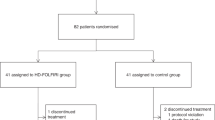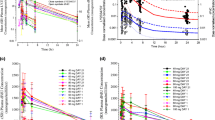Summary
Purpose We performed a UGT1A1 genotype-guided study to determine the maximum tolerated dose (MTD) and evaluate the toxicities and pharmacokinetics of the combination of capecitabine (CAP), oxaliplatin (OX), and irinotecan (IRIN). Experimental design Patients were screened for UGT1A1 *28 genotype prior to treatment. The starting dose (mg/m2) was IRIN (150), OX (85) and CAP (400), days 2–15. Doses were escalated or de-escalated within each genotype group (*28/*28, *1/*28 and *1/*1). IRIN pharmacokinetics was performed at the MTD. Results 50 patients were evaluable for toxicity [11 (*28/*28); 18 (*1/*28); 21 (*1/*1)]. UGT1A1 *28/*28 patients experienced hematologic dose limiting toxicity (DLT), requiring dose-de-escalation. The UGT1A1 *28/*28 recommended phase 2 dose (RP2D) was IRIN (75), OX (85), and CAP (400). In contrast, both UGT1A1 *1/*28 and *1/*1 tolerated higher doses of IRIN and non-hematologic toxicity was dose limiting for UGT1A1 *1/*1. The RP2D was IRIN (150), OX (85), and CAP (400) for UGT1A1*1/*28 and IRIN (150), OX (100), and CAP (1600) for UGT1A1 *1/*1. UGT1A1 *1/*28 and *1/*1 patients treated with IRIN (150) had similar AUCs for the active irinotecan metabolite, SN38 (366 +/− 278 and 350 +/− 159 ng/ml*hr, respectively). UGT1A1 *28/*28 patients (n = 3) treated with a lower IRIN dose (100) had non-significantly higher mean SN38 exposures (604 +/− 289 ng/ml*hr, p = 0.14). Antitumor activity was observed in all genotype groups. Conclusions UGT1A1 genotype affects the dose and pharmacokinetics of the CAPIRINOX regimen and UGT1A1 genotype-guided dosing of CAPIRINOX is ongoing in a phase II study of small bowel cancer (NCT00433550).

Similar content being viewed by others
References
Grothey A, Sargent D, Goldberg RM, Schmoll HJ (2004) Survival of patients with advanced colorectal cancer improves with the availability of fluorouracil-leucovorin, irinotecan, and oxaliplatin in the course of treatment. J Clin Oncol 22:1209–1214
Conroy T, Desseigne F, Ychou M, Bouche O, Guimbaud R et al (2011) FOLFIRINOX versus gemcitabine for metastatic pancreatic cancer. N Engl J Med 364:1817–1825
Goetz MP, Erlichman C, Windebank AJ, Reid JM, Sloan JA et al (2003) Phase I and pharmacokinetic study of two different schedules of oxaliplatin, irinotecan, Fluorouracil, and leucovorin in patients with solid tumors. J Clin Oncol 21:3761–3769
McWilliams RR, Goetz MP, Morlan BW, Salim M, Rowland KM et al (2007) Phase II trial of oxaliplatin/irinotecan/5-fluorouracil/leucovorin for metastatic colorectal cancer. Clin Colorectal Cancer 6:516–521
Falcone A, Ricci S, Brunetti I, Pfanner E, Allegrini G et al (2007) Phase III trial of infusional fluorouracil, leucovorin, oxaliplatin, and irinotecan (FOLFOXIRI) compared with infusional fluorouracil, leucovorin, and irinotecan (FOLFIRI) as first-line treatment for metastatic colorectal cancer: the Gruppo Oncologico Nord Ovest. J Clin Oncol 25:1670–1676
Hoskins JM, Goldberg RM, Qu P, Ibrahim JG, McLeod HL (2007) UGT1A1*28 genotype and irinotecan-induced neutropenia: dose matters. J Natl Cancer Inst 99:1290–1295
Innocenti F, Undevia SD, Iyer L, Xian Chen P, Das S et al (2004) Genetic variants in the UDP-glucuronosyltransferase 1A1 gene predict the risk of severe neutropenia of irinotecan. J Clin Oncol 22(8): 1382–1388.
Toffoli G, Cecchin E, Corona G, Russo A, Buonadonna A et al (2006) The role of UGT1A1*28 polymorphism in the pharmacodynamics and pharmacokinetics of irinotecan in patients with metastatic colorectal cancer. J Clin Oncol 24:3061–3068
Iyer L, King CD, Whitington PF, Green MD, Roy SK et al (1998) Genetic predisposition to the metabolism of irinotecan (CPT-11). Role of uridine diphosphate glucuronosyltransferase isoform 1A1 in the glucuronidation of its active metabolite (SN-38) in human liver microsomes. J Clin Invest 101:847–854
Iyer L, Hall D, Das S, Mortell MA, Ramirez J et al (1999) Phenotype-genotype correlation of in vitro SN-38 (active metabolite of irinotecan) and bilirubin glucuronidation in human liver tissue with UGT1A1 promoter polymorphism. Clin Pharmacol Ther 65:576–582
Ando Y, Saka H, Ando M, Sawa T, Muro K et al (2000) Polymorphisms of UDP-glucuronosyltransferase gene and irinotecan toxicity: a pharmacogenetic analysis. Cancer Res 60:6921–6926
Freyer G, Duret A, Milano G, Chatelut E, Rebischung C et al (2011) Pharmacogenetic tailoring of irinotecan-based first-line chemotherapy in metastatic colorectal cancer: results of a pilot study. Anticancer Res 31:359–366
Kanekiyo S, Hazama S, Kondo H, Nagashima A, Eto R et al (2013) UDP-glucuronosyltransferase (UGT) 1A1*28 polymorphism-directed phase II study of irinotecan with 5′-deoxy-5-fluorouridine (5′-DFUR) for metastatic colorectal cancer. Anticancer Res 33:3423–3430
Kim KP, Kim HS, Sym SJ, Bae KS, Hong YS et al (2013) A UGT1A1*28 and *6 genotype-directed phase I dose-escalation trial of irinotecan with fixed-dose capecitabine in Korean patients with metastatic colorectal cancer. Cancer Chemother Pharmacol 71:1609–1617
Marcuello E, Paez D, Pare L, Salazar J, Sebio A et al (2011) A genotype-directed phase I-IV dose-finding study of irinotecan in combination with fluorouracil/leucovorin as first-line treatment in advanced colorectal cancer. Br J Cancer 105:53–57
Satoh T, Ura T, Yamada Y, Yamazaki K, Tsujinaka T et al (2011) Genotype-directed, dose-finding study of irinotecan in cancer patients with UGT1A1*28 and/or UGT1A1*6 polymorphisms. Cancer Sci 102:1868–1873
Takano M, Goto T, Hirata J, Furuya K, Horie K et al (2013) UGT1A1 genotype-specific phase I and pharmacokinetic study for combination chemotherapy with irinotecan and cisplatin: a Saitama Tumor Board study. Eur J Gynaecol Oncol 34:120–123
Simon R, Freidlin B, Rubinstein L, Arbuck SG, Collins J et al (1997) Accelerated titration designs for phase I clinical trials in oncology. J Natl Cancer Inst 89:1138–1147
Zeuli M, Di Costanzo E, Sdrobolini A, Gasperoni S, Paoloni FP et al (2001) Capecitabine and oxaliplatin in advanced colorectal cancer: a dose-finding study. Ann Oncol: Off J Eur Soc Med Oncol 12:1737–1741
Therasse P, Arbuck SG, Eisenhauer EA, Wanders J, Kaplan RS et al (2000) New guidelines to evaluate the response to treatment in solid tumors. European Organization for Research and Treatment of Cancer, National Cancer Institute of the United States, National Cancer Institute of Canada. J Natl Cancer Inst 92:205–216
Akaba K, Kimura T, Sasaki A, Tanabe S, Ikegami T et al (1998) Neonatal hyperbilirubinemia and mutation of the bilirubin uridine diphosphate-glucuronosyltransferase gene: a common missense mutation among Japanese, Koreans and Chinese. Biochem Mol Biol Int 46:21–26
Santisteban M, Buckner JC, Reid JM, Wu W, Scheithauer BW et al (2009) Phase II trial of two different irinotecan schedules with pharmacokinetic analysis in patients with recurrent glioma: North Central Cancer Treatment Group results. J Neurooncol 92:165–175
McLeod HL, Sargent DJ, Marsh S, Fuchs C, Ramanathan R et al (2003) Pharmacogenetic analysis of systemic toxicity and response after 5-Fluorouracil (5-FU/CPT-11, 5FU/oxaliplatin (oxal) or CPT-11/oxal therapy for advanced colorectal cancer (CRC): results from an intergroup trial. Proc Am Soc Clin Oncol 22:253
Acknowledgments
We thank Sacha Nelson and Deb Kaul (Protocol Development Coordinators), Kim Jensen and Janet Lensing (Certified Research Associates), Jill Piens (Research nurse) and the patients who participated in this trial.
Conflicts of interest
The authors have no conflicts of interest to report.
Author information
Authors and Affiliations
Corresponding author
Additional information
Matthew P. Goetz and Heidi A. McKean contributed equally to this work.
Supported in part by U01 CA69912, RR024150 (from the Mayo Clinic General Clinical Research Center), CA15083 (Mayo Clinic Comprehensive Cancer Center) CA90628-03 (K-12) (MPG) and Commonwealth Foundation for Cancer Research (MPG and MMA).
Rights and permissions
About this article
Cite this article
Goetz, M.P., McKean, H.A., Reid, J.M. et al. UGT1A1 genotype-guided phase I study of irinotecan, oxaliplatin, and capecitabine. Invest New Drugs 31, 1559–1567 (2013). https://doi.org/10.1007/s10637-013-0034-9
Received:
Accepted:
Published:
Issue Date:
DOI: https://doi.org/10.1007/s10637-013-0034-9




